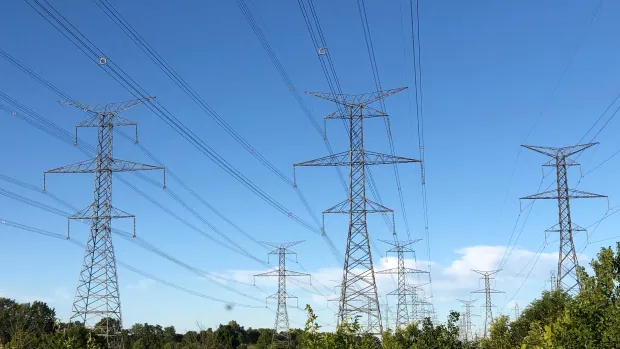Premier Doug Ford’s government is working on a plan to sell “clean energy credits” to companies wanting to lower their carbon footprint, but environmental groups say the move stands to do nothing about reducing Ontario’s CO2 emissions.

Premier Doug Ford’s government is working on a plan to sell “clean energy credits” to companies wanting to lower their carbon footprint, but environmental groups say the move would do nothing to reduce Ontario’s carbon dioxide emissions.
Clean energy credits are similar to carbon offset schemes, such as those offered by airlines to passengers who want to pay extra to compensate for the emissions generated by their flight.
The government is aiming to create a market for clean energy credits tied to Ontario’s electricity generating system, which is 94 per cent emission-free.
Ontario’s proposal would mean businesses could buy the credits voluntarily and count them toward any corporate target they set for reducing their greenhouse gas emissions.
However, it’s far from clear that the sale of the credits will actually cut emissions or make Ontario’s electricity system any greener.
Criticism of the plan is coming from The Atmospheric Fund, a non-partisan public agency that works with government and the private sector on climate change issues in the Greater Toronto and Hamilton area.

Bryan Purcell, vice-president of policy and programs for The Atmospheric Fund, said the government’s proposal has fundamental flaws that undermine any environmental benefit.
As Purcell sees it, the government’s plans for the revenue from selling the credits are central to the flaws. The revenue would be earmarked to subsidizing electricity prices, with no commitment of putting it toward the cost of building new clean power plants.
“Whether they know it or not, companies would be buying a credit that does nothing to reduce actual emissions in real life and just simply allows them to claim a lower carbon footprint,” said Purcell.
Purcell argues that making electricity cheaper through subsidies increases consumption. In Ontario’s current system, the more demand there is for electricity, the more that gas-fired power plants contribute to the supply.
“So if we are putting all this money from the clean energy credits into subsidizing electricity for everyone else … that’s actually driving increased carbon emissions from the electricity system in Ontario,” Purcell said.
With the clean energy credit market still in development, the government hasn’t actually ruled out putting it toward new clean generating facilities.
In January, Energy Minister Todd Smith assigned the province’s Independent Electricity System Operator (IESO) to develop a plan. The agency is to provide a report to the government by early July, about a month after the provincial election, with the aim for the market to launch early next year.
Smith was not available for an interview, but in a statement said a clean energy credits market would leverage Ontario’s electricity system to attract businesses that are committed to environmental goals.
Such a market “could return funds raised through the purchase of these credits to Ontario ratepayers to reduce rates and would support future clean energy generation in the province,” said Smith in the statement.
“We know increased electrification is key to displacing carbon based fuels and lowering emissions, and affordable clean electricity is the best tool we have to achieve this.”
Under the government’s latest long-term energy plan, gas-fired power plants are forecast to ramp up to providing 25 per cent of Ontario’s electricity mix by 2040. Smith has asked the IESO to assess the alternative of a moratorium on new natural gas generation and moving toward a zero-emission electricity grid.
Assessing potential demand
Pitching the green credentials of Ontario’s electricity system could be seen as a departure for the Progressive Conservatives. Scrapping the previous government’s Green Energy Act was one of Ford’s first orders of business after winning the election in 2018.
That Liberal government initiative was focused on boosting wind and solar energy generation, at premium prices. The province also ended coal-fired electricity generation, significantly reducing Ontario’s CO2 emissions.
But over the past decade, electricity prices rose sharply. The government now puts in $6.5 billion in taxpayer funds annually to subsidize hydro bills.
There’s no indication how much money the government expects to bring in from selling clean energy credits. The IESO is currently assessing the potential demand from companies.

“We’re seeing businesses across Ontario establish clean energy goals, electrification and decarbonization goals. Clean energy credits are a mechanism by which businesses can achieve both goals,” said Katherine Sparkes, the IESO’s director of innovation, research and development.
“It’s really important that we understand what are the clean energy goals of businesses across Ontario. We need to understand the magnitude and the timing of those goals so that we can understand what volume they might be looking to purchase.”
The activist group Environmental Defence is dismissing the government’s proposed clean energy credit system as a form of greenwashing.
“It allows companies to claim credit for existing clean electricity generation resources instead of actually greening their own power consumption,” said Lana Goldberg, the group’s Ontario climate program manager, in an email to CBC News.
Goldberg said the government needs a plan to transition to a fully clean electricity grid rather than ramping up gas plant usage.

